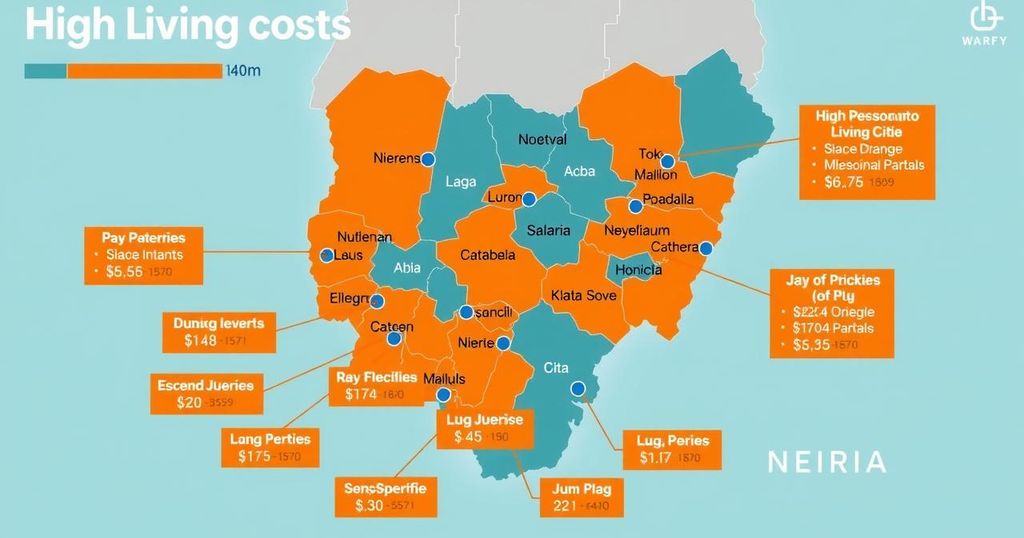Top 10 Most Expensive States to Live in Nigeria as of February 2025
In February 2025, Nigeria’s inflation rate decreased to 23.18%, with food prices remaining the primary contributor. The ten states experiencing the highest inflation rates were detailed, highlighting significant annual and month-on-month increases in various sectors, particularly food. Edo emerged as the most expensive state with an inflation rate of 33.6%.
In February 2025, Nigeria’s headline inflation rate eased to 23.18%, a decline from 24.48% in January. This marks a decrease of 1.30% from the previous month and an impressive drop of 8.52 percentage points since February 2024. The slowdown in inflation can be attributed to decreasing food prices and reduced pressures in several consumer categories.
Food and non-alcoholic beverages were major contributors to inflation, accounting for 9.28% of the overall rate year-on-year. Other contributing sectors included accommodation services, transport, housing, utilities, and education. Month-on-month food prices were the primary driver, adding 0.82% to inflation, followed by accommodation services and transport.
Urban inflation in February 2025 stood at 25.15%, a decline from 33.66% in February 2024, with a month-on-month increase of 2.40%. Rural inflation averaged 19.89%, significantly lower than the prior year’s 29.99%. Month-on-month, rural prices increased by 1.16%, indicating greater stability compared to urban areas.
Food inflation reached 23.51% year-on-year in February 2025, a notable decrease from 37.92% in February 2024, partly due to adjustments in the base year for measurements. The month-on-month food inflation rate was 1.67%, reflecting a slowdown in price rises, with certain staples like yam tubers and potatoes experiencing price drops.
Core inflation, excluding volatile agricultural and energy prices, was at 23.01%, down from 25.13% the previous year, with a month-on-month figure of 2.52%. As inflationary challenges continue, households and businesses face escalating costs, particularly in states experiencing the highest cost of living increases.
The following is a list of the 10 most expensive states in Nigeria as of February 2025:
10. Ebonyi – Inflation Rate: 25.1% (Food Inflation: 28.1%): Although annual food inflation is high, month-on-month increases are minimal, suggesting stabilization in prices.
9. Nasarawa – Inflation Rate: 25.3% (Food Inflation: 33.5%): Food inflation surged sharply, reflecting ongoing cost pressures in the state.
8. Ogun – Inflation Rate: 25.8% (Food Inflation: 23.0%): The inflation figures indicate contributions from non-food sectors as food prices rose slowly.
7. Gombe – Inflation Rate: 26.5% (Food Inflation: 28.5%): Here, food costs drive inflation rates significantly.
6. Abia – Inflation Rate: 29.2% (Food Inflation: 31.9%): Monthly increases remain moderate despite high annual inflation.
5. Zamfara – Inflation Rate: 29.3% (Food Inflation: 28.2%): While food inflation persists, it is not the primary contributor to overall rising costs.
4. Imo – Inflation Rate: 30.1% (Food Inflation: 29.0%): A variety of items are contributing to the overall high inflation in comparison to food.
3. Sokoto – Inflation Rate: 30.2% (Food Inflation: 38.3%): The state is facing severe inflation pressures, particularly in food prices.
2. Enugu – Inflation Rate: 30.7% (Food Inflation: 31.6%): Competitive inflation rates in multiple sectors indicate steady price increases.
1. Edo – Inflation Rate: 33.6% (Food Inflation: 35.1%): With the highest inflation rate nationwide, Edo’s rising costs continue to exert financial pressure on residents.
The analysis of Nigeria’s inflation landscape in February 2025 reveals notable fluctuations across states, with Edo emerging as the most expensive, marked by sharp food inflation. Other states such as Enugu and Sokoto also exhibited significant merchant pressures, particularly in food prices. The inflationary trends suggest that monitoring of economic conditions remains crucial for households and businesses navigating these challenging economic circumstances.
Original Source: nairametrics.com




Post Comment